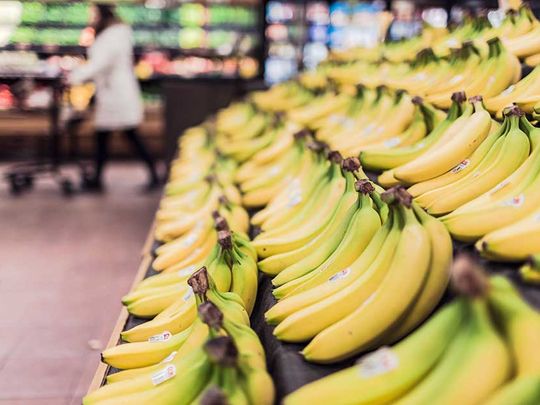
Ridiculous news. Britons throw away 1.4 million edible bananas every day, apparently because they have small black, brown or green marks on the skin. Yes, even a bit of green. What have people learnt at school? Anything about the natural world, cookery or nutrition? No? Well, a banana is not just a useful sticky-up thing for sex-education classes and to embarrass your teacher. It is edible, and comes in various skin colours. Green means they’re not even ripe yet, you duffers.
I’ve just had a look at my current stock of bananas. Not one of them is without such a blemish. But I promise I’ll eat them all, even if the skins go totally black, because they’ll be perfectly all right on the inside. And if I don’t want to eat them in a straightforward way, there are plenty of other things I could do with my bananas. I could sing about them, make vulgar jokes and gestures, trip up my enemies, or ruin a politician’s career. Look what happened to poor David Miliband, who unwisely brandished a banana — an almost flawless one — at the Labour conference in 2008. What an odd thing to do. Naturally the Tories served bananas at their subsequent conference complete with Miliband stickers. That was him more or less done for.
But let’s not concentrate on spiteful usage. You could be benevolent with your unwanted bananas. How about giving them away, if they’re not quite perfect enough for you, to starving people and food banks — all too plentiful in today’s UK. And if you’re discarding your green ones, than that gives you even more time for redistribution, while they ripen.
I know it’s mundane, and you probably haven’t got the time, but you could use your blackening bananas to cook: cakes and breads; stick them in curries and fruit salads; bake them in their skins, then peel and eat hot with Barbados sugar, lemon juice, brandy and cream. Yum. You choose.
Versatile
Bananas are so versatile. Or you could mash them for your baby, who won’t care about little brown marks. And if the child is picky, remove the supposedly blemished skin first and avoid transmitting your anxiety and futile search for aesthetic fruit perfection. Or give them to your dog — potassium is good for dogs, but don’t feed bananas to your tortoise. It’s dangerous.
Bananas can also help you to answer the big questions in life: Am I ever going to be happy? And such like. You may not know this, but if you cut the very end off a banana (the pointy bit at the bottom end, not the stem end), you will find that the cut exposes a black dot, or a black Y. Ask the important question, then take a look: a dot means “no”, a Y means “yes”.
A few years ago my local supermarket asked customers for clever ideas to boost sales, so I begged them to sell imperfect, oddly shaped fruit and veg, including lovely, delicious bananas, for less money. It would have been a win-win for everyone: the shop, farmers, customers, bananas. But did they do it? No they did not.
If, after all my advice, you’re still panicking about your bananas rotting, then you can buy a drawstring banana bag — yellow to match its contents — and store them in your fridge so they’ll keep longer. But please eat them. Go on. My dad had to eat one a day, because they were good for his weedy heart, but they’re also good for your blood pressure, eyes and bones; they relax your muscles, help you to sleep and enhance your mood.
What more do you want? And hurry up, make the most of them, blemished or not, while they’re still around, because they may not be for much longer. In the 1990s, a new strain of the fungal disease Fusarium wilt appeared and is now a global threat to the banana, say geneticists. You’ll be sorry when they’re gone.
— Guardian News & Media Ltd
Michele Hanson is an author and Guardian columnist.









